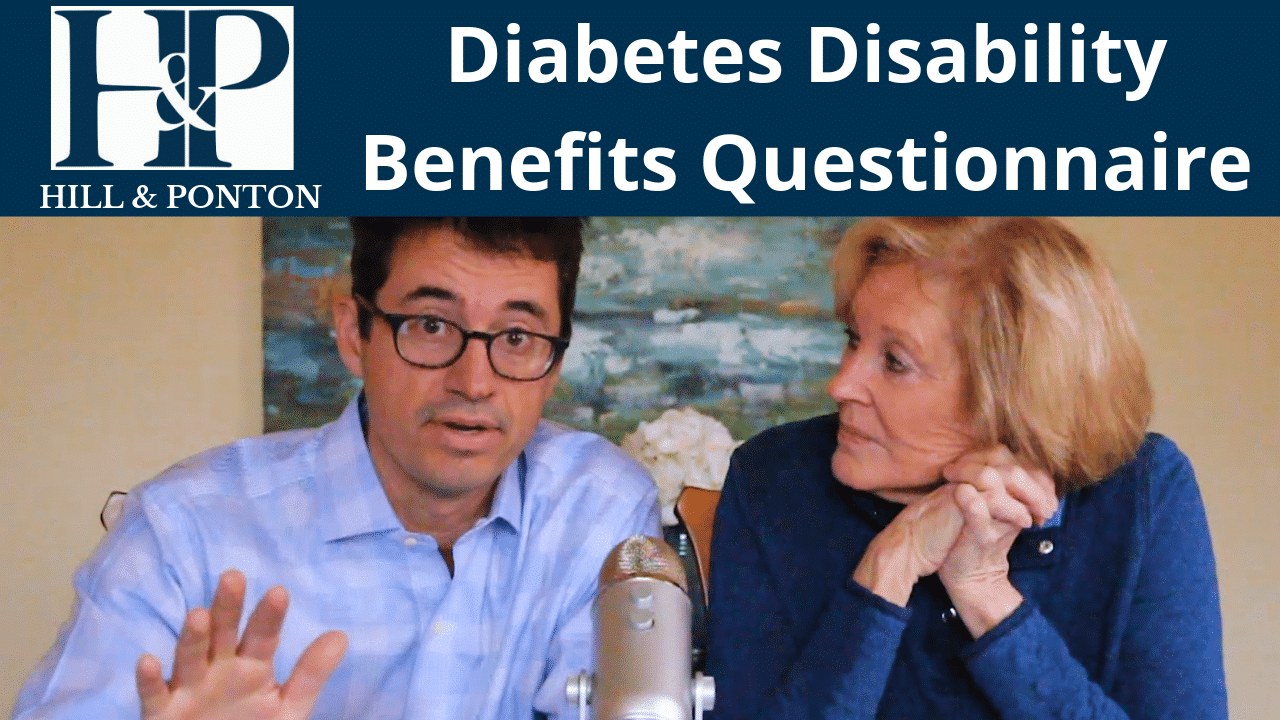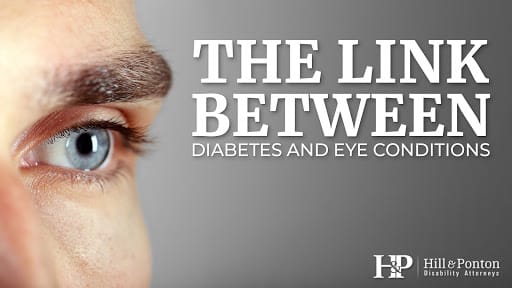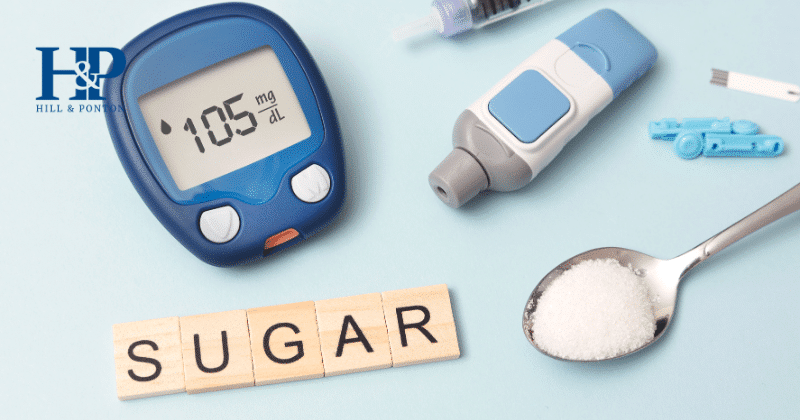A Compensation & Pension (C&P) exam for Diabetes Mellitus is designed to evaluate the severity and impact of the veteran’s condition and it is a key part of determining a disability rating or verifying service connection.
What Happens During the C&P Exam?
The C&P examiner is supposed to:
- Document restrictions on diet, physical activities, and weight loss
- Provide a full description of the effects of diabetes on daily life and employment
- Specify whether regulation of activities is medically required, not merely employer-enforced
- Assess complications caused by diabetes
Complications may include cardiovascular issues, neurological disorders, kidney problems, eye conditions and more. Some complications are compensable and should be rated separately from the diabetes.
In the video below, VA attorneys Matthew Hill and Carol Ponton talk about the diabetes C&P exam and how the Disability Benefit Questionnaire the VA uses for diabetes can help you uncover secondary conditions that will increase your rating.
Attorney Tips for the Diabetes C&P Exam (Video)
Matthew Hill has written THE book on how to prepare (and win!) your VA claim. Get The Road to VA Compensation Benefits for free as an ebook or in print.
Get the free ebookVideo Transcript
Matthew Hill: Hello and welcome to another Hill And Ponton VA video blog. I’m Matthew Hill here with Carol Ponton and we want to talk to you today about DBQs, disability benefit questionnaires that are used at exams where the VA tries to figure out if your case is service-connected or what the rating is and those exams are C&P exams. The DBQ, what’s great about this is that you can actually download these forms before going into the exam and why that’s important is that their boilerplate, they basically go through the same thing for each and every veteran and you can try to understand what’s going on with your case and how you can help the doctor understand the problems you’re having. Let’s talk about why this is important. We’ll talk about it specifically with diabetes. Diabetes is a disease that can affect almost every system-
Carol Ponton: Every part of your body.
Matthew Hill: It’s awful and it can affect other parts of your body other than the diabetes itself pretty significantly when it comes to terms of rating your disability. So a common rating that a veteran will get for diabetes itself is 20%.
Carol Ponton: Right.
Matthew Hill: Which seems really low when you talk to a veteran who’s had problems. I talked to veterans all the time who have a 20% rating, but then they have problems with their legs called neuropathy, and that’s basically where pain-
Carol Ponton: Arms and hands.
Matthew Hill: Yeah arms and hands. You can have it in any extremity. That’s basically where pain, numbness or tingling will go down to that extremity and it’ll get to the point sometimes where veterans can’t walk, they can’t hold a pen, they just feel painful all the time. Those ratings for each extremity, they can be 10%, 20%, 40% and so if you get multiple ratings on extremity, you all of a sudden go from a 20% rating for diabetes up to a 60 or 80% rating for diabetes.
Matthew Hill: One a one veteran I remember in particular was seemed to be a pretty healthy young man. He had a 20% rating for diabetes and he didn’t have any problems with the tingling in his arms or his legs. But what he did have was abnormal readings on his test for his kidney and the kidney, the nephropathy is another area where the VA should be rating secondary to the veterans diabetes. And that rating is actually 60%. So again he had a 20% rating just for his diabetes and then he had a separate 60% for his kidney not functioning properly. So it’s important with diabetes in particular to look at these disability questionnaires and look and see what else is a problem for me. And what else should I be telling the doctor about.
Carol Ponton: This disability questionnaire is really one of the best they have because diabetes causes so many problems that the veterans don’t know that. And so if you read down, it can cause hypertension, it can cause depression. It can cause diabetic retinopathy. So you don’t see well. It can cause glaucoma. The chronic kidney disease, the sad thing about that is most of these veterans have no idea that they have it. They don’t know the diabetes has affected their kidney and the only way they would know that is if their doctor tells them what doesn’t seem to happen.
Matthew Hill: Through blood tests.
Carol Ponton: Or through a blood test that they can read. So on the blood test, you’re looking for the bun, creatine, Microalbumin. You’re looking for those things that are abnormal. And I’ve had veterans that have come in and they have had an abnormal kidney function test for the last 15 years and had no idea that they had that.
Carol Ponton: And that’s a rating that we were able to get all the way back because it was there in the record, but nobody brought it up. But sometimes make your case easy for the VA to rate. Look through all of these things and see how about a cardiac condition. Do you have a heart problem that’s caused by diabetes? It’s just endless. The list of problems that diabetes causes, unfortunately. And so you need to know that you need to point out to them these problems have occurred in you because they’re not going to know if you don’t tell them. And diabetes is one where people clearly get 100% and sometimes a lot more than a hundred percent because it is so devastating. And I feel really sad when they come to me with a 20% rating.
Matthew Hill: Right?
Carol Ponton: And they are is impaired as they are.
Matthew Hill: Right? It’s the secondary conditions. And the thing about these disability questionnaires, especially with diabetes, when you turn to the second page of it, it basically says, do you have any problems? Like Carol was saying, the hypertension, the cardiac problems, the renal failure. And then it actually refers to other disability questionnaires. So this can be a little bit of a chase for you, but it’s a chase worth making and that you see, okay, I do have this problem, now I need to go to this other disability questionnaire and figure out how it affects me there. And knowledge is power. So you walk into this exam and you say, “Doc, I have diabetes, but here’s the secondary problem. Or here’s these other problems. And I went to this other disability questionnaire and this is what it said,” so that you’re getting the proper rating.
Carol Ponton: Right. And remember as always, depression. And the reason I say that is when you have something as devastating as diabetes can be there, don’t tell me you’re not depressed when you can’t do the things that you want to do. I’ve had many clients tell me that they can’t put a cover on their feet because it burns. I mean it would be freezing, but they can’t put anything on their feet because they hurt so badly. Lives are really affected by this. So always, always make sure that you’re claiming that depression if you have that, because it goes along with this.
Matthew Hill: Yeah. And you know there’s a stigma with depression and there’s a stigma with men in particular claiming it and diabetes in the VA front, diabetes mostly affect older veterans, especially Vietnam era veterans. Those who served in Vietnam. And what I’ve seen is they want to talk about that at all. And what I try to tell my clients, say, “Look, you would be abnormal if you didn’t have depression because of this. Because your whole life has changed. Your identity has changed. The purpose of who you were is no longer, because now you can’t get up and go to work every day. You can’t get up and do the work around the house you did every day.” So it’s important to think about those things. And frankly it’s important to talk to your wives and those who live with you to say, do they see a change in you? And is it something that affects you?
Carol Ponton: And once again, don’t only complain to the VA examiner. Complain to your doctor, get treated for this cause there is some help with this. So make sure that you just bring all these problems to your doctor. Start getting treated for them. And then when you have your C&P exams, luckily they can often pull your records and they’ll see them there. But it’s something regardless you have to bring to their attention.
Matthew Hill: Well, thank you for joining us today on this video blog, and we look forward to seeing you in this space soon.
Join Thousands of Veterans!
Get the weekly newsletter that has helped veterans all over the country in the fight for their rightful benefits
join for free



